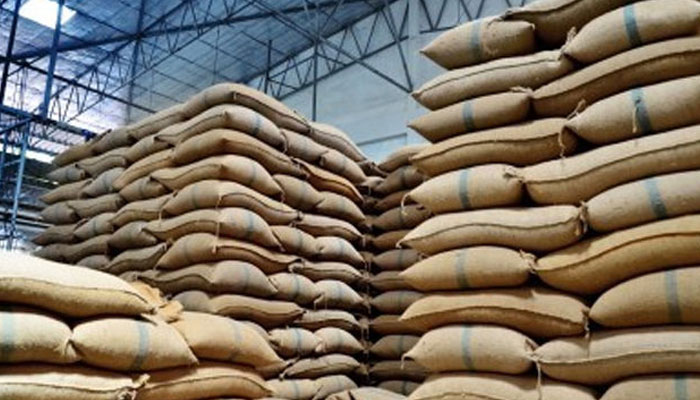Rs280 bn for wheat procurement is just an eyewash
ISLAMABAD: In an eyewash, the government has included Rs280 billion for procurement of eight million tons of wheat as part of Rs1.25 trillion relief package as it would be purchased by Passco and provinces from the banks for paying support price to the farmers.
“It’s a routine operation undertaken by Passco and provinces jointly every year but the government in an effort to balloon the relief package decided to include procurement of wheat as part of the relief package but in reality this amount of Rs280 billion had nothing to do with the budgetary numbers,” top official sources confirmed to The News here on Wednesday.
In the budget for 2019-20, the government had earmarked only Rs15 billion subsidy for Passco including Rs2 billion for wheat operation, Rs5 billion for wheat reserved stocks and Rs8 billion for wheat supply to Gilgit-Baltistan.
This year again the Passco and provinces would have to get loans for commodity operation from the banks as the Ministry of Finance would help them get credit lines from the banks. “In any way the government cannot declare part of budgetary relief it is going to provide to people for its efforts to mitigate the losses caused by COVID-19 virus,” said the official.
This scribe made efforts to get version of Federal Minister for National Food Security Khusro Bakhytar but could not contact him.
Meanwhile, independent economists on the financial package of Rs1.25 trillion told The News on Wednesday that there was limited additional funding available under this package as the Finance Ministry made number crunching to make adjustments only with the purpose to balloon the overall figures but actually it was just adjustments to show increased figures in order to please the rulers. The Ehsas Programme, they said, possessed allocation of Rs190 billion out of which the utilisation stood at Rs50 to Rs60 billion so these resources were diverted towards providing monthly stipends to the poorest segment of the society.
They said that first of all this economic team lacked clarity of thoughts in its economic vision as the State Bank of Pakistan (SBP) was cutting down policy rate in the range of 225 basis points through two Monetary Policy Committee meeting in short span of timeframe. They argued that the policy rate should be brought down into single digit within the range of 5 to 6 percent in one go in the aftermath of eruption of coronavirus because no one was willing to make any investment at this point of time. They said that no one was ready to make small investments so expecting that industrialists would go for new investment simply indicated that those at helm of affairs did not have any clue about Pakistan’s realities on the economic front. They stated that Ministry of Finance used same old methods to undertake number crunching but there was no policy behind these numbers. They were of the view that there was requirement of allocating resources towards health and medical provisions and how the poor segment of the society would be provided food at their doorsteps in the wake of severe closedown all over the country.
They said that there was no coordination among the Centre and provinces on execution of relief package as the government should have announced to provide monthly stipend of Rs3,000 to the local governments. If the local governments did not exist, the local administration can be utilised for effective utilisation of funds.
-
 Hong Kong Court Sentences Media Tycoon Jimmy Lai To 20-years: Full List Of Charges Explained
Hong Kong Court Sentences Media Tycoon Jimmy Lai To 20-years: Full List Of Charges Explained -
 Coffee Reduces Cancer Risk, Research Suggests
Coffee Reduces Cancer Risk, Research Suggests -
 Katie Price Defends Marriage To Lee Andrews After Receiving Multiple Warnings
Katie Price Defends Marriage To Lee Andrews After Receiving Multiple Warnings -
 Seahawks Super Bowl Victory Parade 2026: Schedule, Route & Seattle Celebration Plans
Seahawks Super Bowl Victory Parade 2026: Schedule, Route & Seattle Celebration Plans -
 Keto Diet Emerges As Key To Alzheimer's Cure
Keto Diet Emerges As Key To Alzheimer's Cure -
 Chris Brown Reacts To Bad Bunny's Super Bowl LX Halftime Performance
Chris Brown Reacts To Bad Bunny's Super Bowl LX Halftime Performance -
 Trump Passes Verdict On Bad Bunny’s Super Bowl Halftime Show
Trump Passes Verdict On Bad Bunny’s Super Bowl Halftime Show -
 Super Bowl 2026 Live: Seahawks Defeat Patriots 29-13 To Win Super Bowl LX
Super Bowl 2026 Live: Seahawks Defeat Patriots 29-13 To Win Super Bowl LX -
 Kim Kardashian And Lewis Hamilton Make First Public Appearance As A Couple At Super Bowl 2026
Kim Kardashian And Lewis Hamilton Make First Public Appearance As A Couple At Super Bowl 2026 -
 Romeo And Cruz Beckham Subtly Roast Brooklyn With New Family Tattoos
Romeo And Cruz Beckham Subtly Roast Brooklyn With New Family Tattoos -
 Meghan Markle Called Out For Unturthful Comment About Queen Curtsy
Meghan Markle Called Out For Unturthful Comment About Queen Curtsy -
 Bad Bunny Headlines Super Bowl With Hits, Dancers And Celebrity Guests
Bad Bunny Headlines Super Bowl With Hits, Dancers And Celebrity Guests -
 Insiders Weigh In On Kim Kardashian And Lewis Hamilton's Relationship
Insiders Weigh In On Kim Kardashian And Lewis Hamilton's Relationship -
 Prince William, Kate Middleton Private Time At Posh French Location Laid Bare
Prince William, Kate Middleton Private Time At Posh French Location Laid Bare -
 Stefon Diggs Family Explained: How Many Children The Patriots Star Has And With Whom
Stefon Diggs Family Explained: How Many Children The Patriots Star Has And With Whom -
 ‘Narcissist’ Andrew Still Feels ‘invincible’ After Exile
‘Narcissist’ Andrew Still Feels ‘invincible’ After Exile




